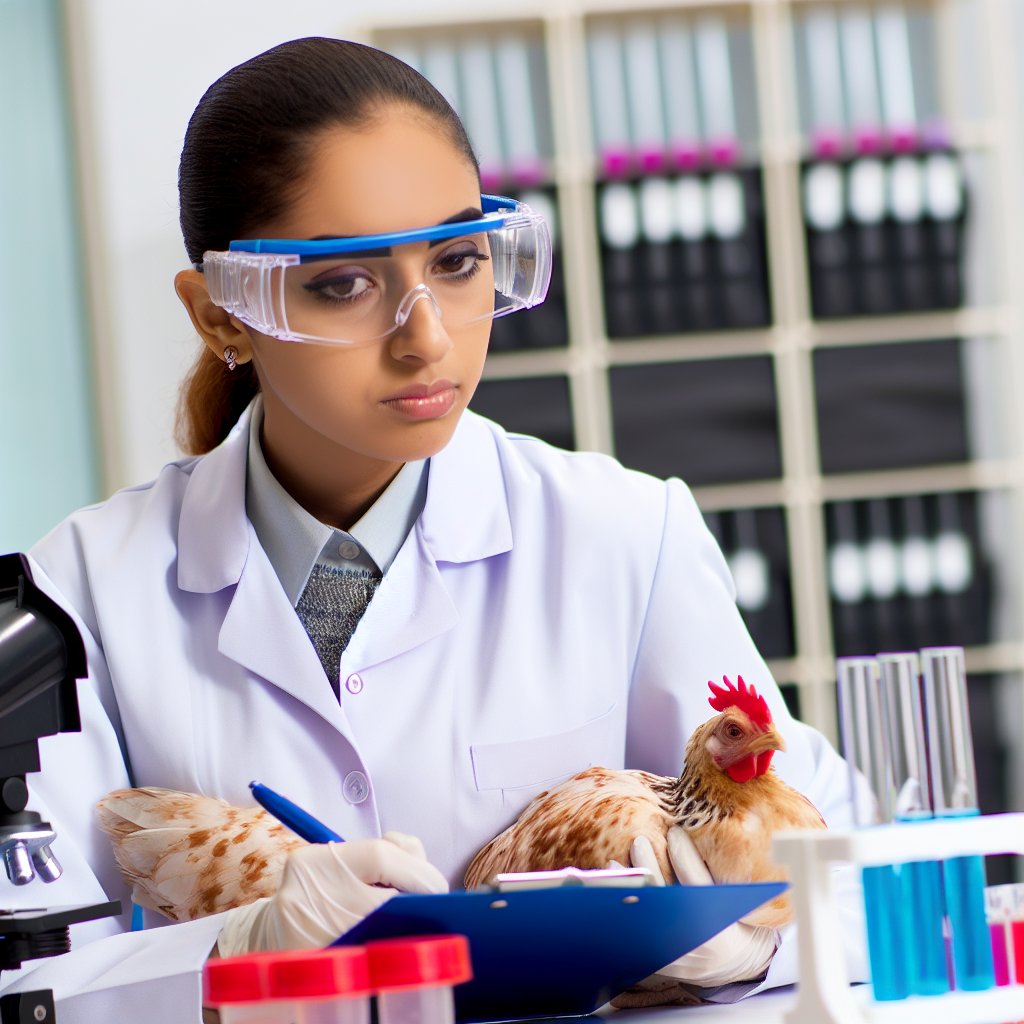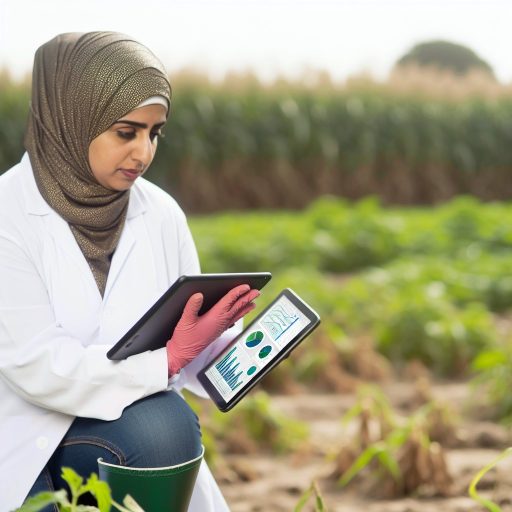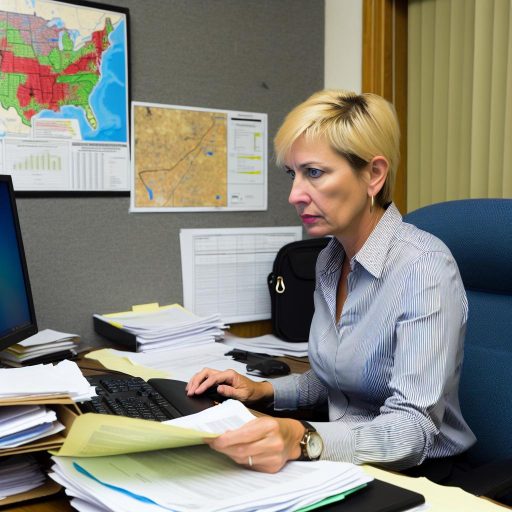Introduction:
Define poultry science: Poultry science is the study of poultry, including chickens, turkeys, ducks, and other domesticated birds.
Briefly introduce the career outlook for poultry scientists in the U.S.: Poultry scientists play a crucial role in the poultry industry by conducting research, developing new technologies, and ensuring the health and welfare of poultry.
Mention the importance of poultry scientists in the agriculture industry: Poultry scientists contribute to the sustainability and productivity of the agriculture industry by improving poultry production, animal welfare, and food safety.
Educational Requirements:
When it comes to pursuing a career as a poultry scientist in the U.S., there are specific educational requirements that individuals must meet.
Individuals typically need at least a bachelor’s degree in a related field to become a successful poultry scientist.
While a bachelor’s degree is the minimum requirement, many poultry scientists pursue advanced degrees such as a master’s or Ph.D. in poultry science or a related field.
A strong background in biology and agriculture is essential for poultry scientists as they work with living organisms and agricultural systems.
A combination of classroom education, laboratory experience, and hands-on training is crucial for aspiring poultry scientists.
These elements help them gain the necessary knowledge and skills to succeed in the field.
Job Responsibilities:
Poultry scientists are responsible for conducting research to improve poultry production processes.
They also oversee production management, ensuring the efficient and effective operation of poultry farms.
Quality control is another essential duty, ensuring that poultry products meet safety and quality standards.
Roles of Poultry Scientists:
Poultry scientists conduct studies to develop new techniques and products for the poultry industry.
They oversee all aspects of poultry production, from breeding to processing.
Poultry scientists ensure that poultry products are safe, nutritious, and meet regulatory standards.
Importance of Staying Up-to-Date:
Poultry scientists must stay current with industry trends and technologies to remain competitive.
Keeping up with the latest developments allows them to innovate and improve processes in poultry production.
By staying informed, poultry scientists can enhance the efficiency and sustainability of poultry operations.
You Might Also Like: Agricultural Consultants: Industry Trends and Insights
Job Prospects:
The demand for poultry scientists in the U.S. is on the rise.
Transform Your Career Today
Unlock a personalized career strategy that drives real results. Get tailored advice and a roadmap designed just for you.
Start NowFactors influencing job growth include consumer demand for poultry products.
Career opportunities are available in academia, government, and private industry.
Demand for Poultry Scientists in the U.S.
As the poultry industry continues to expand, the need for qualified poultry scientists has never been higher.
Poultry scientists play a crucial role in ensuring the safety and quality of poultry products for consumers.
Factors Influencing Job Growth
One of the key factors driving job growth in the field of poultry science is the increasing consumer demand for poultry products.
With more people choosing poultry as a healthy and affordable protein source, there is a growing need for experts in the field.
Additionally, advancements in technology and research have created new opportunities for poultry scientists to improve production efficiency and sustainability in the industry.
This has opened up new avenues for career growth and specialization within the field.
Career Opportunities in Academia, Government, and Private Industry
Poultry scientists have a wide range of career opportunities available to them, spanning across academia, government agencies, and private industry.
- In academia, poultry scientists can pursue teaching and research positions at universities and colleges.
- They can also mentor and train the next generation of poultry science professionals.
- Government agencies, such as the U.S. Department of Agriculture (USDA) and the Food and Drug Administration (FDA), offer opportunities for poultry scientists to be involved in policy-making, food safety regulation, and public health initiatives.
- In the private sector, poultry scientists can work for poultry companies, feed manufacturers, research institutions, and consulting firms.
- They can contribute to product development, quality control, and research and development efforts.
Overall, the career outlook for poultry scientists in the U.S. is promising, with diverse opportunities for growth and advancement in various sectors of the poultry industry.
Explore Further: Continuing Education for Pest Control Advisors
Salary and Benefits:
– The average salary for poultry scientists in the U.S. is around $70,000 per year.
– Healthcare benefits typically include medical, dental, and vision coverage for employees and their families.
– Retirement plans such as 401(k) matching contributions are commonly offered by employers in this field.
– Job stability is high for poultry scientists due to the consistent demand for poultry products.
Opportunities for Advancement:
– Poultry scientists can advance to management roles, leading research teams and overseeing projects.
– With experience, poultry scientists can specialize in areas such as genetics, nutrition, or disease control.
– Advanced degrees or certifications can lead to higher salaries and more senior positions in the field.
– Industry conferences and networking events offer opportunities for professional growth and career advancement.
Showcase Your Business Today
Reach thousands of readers actively exploring professional services. Publish your business profile and grow your audience now.
Publish NowSalary Growth in the Field:
– Poultry scientists can increase their salaries by taking on additional responsibilities or pursuing advanced degrees.
– Years of experience and a track record of successful projects can also lead to salary growth in the field.
– Job performance evaluations and merit-based raises are common ways for poultry scientists to increase their salaries over time.
– As the demand for poultry products rises, so too does the potential for salary growth in the field.
By taking advantage of opportunities for advancement, continuing education, and networking within the industry, poultry scientists can enjoy a fulfilling career with competitive salaries and benefits.
Discover More: Educational Path: Becoming an Entomologist in the USA

– Skills and qualities:
- Attention to detail is crucial in analyzing data and identifying patterns in poultry research.
- Critical thinking is essential for problem-solving and designing research experiments in poultry science.
- Strong problem-solving skills are needed to address challenges in poultry production and management.
– Importance of communication and teamwork:
- Effective communication is vital for collaborating with colleagues, presenting research findings, and writing reports.
- Teamwork is essential for fostering collaboration in research projects, sharing knowledge, and achieving common goals.
- Collaborating with veterinarians, nutritionists, and other experts in the field requires teamwork and communication skills.
As a poultry scientist in the U.S., possessing a combination of essential skills and qualities is crucial for success in this dynamic industry.
Attention to detail is paramount in analyzing data related to poultry research. Poultry scientists must meticulously examine information to identify patterns, trends, and potential areas for further investigation.
Critical thinking skills play a vital role in problem-solving within the poultry science field. From designing research experiments to interpreting results, the ability to think critically is fundamental to making informed decisions and advancing knowledge in the industry.
Strong problem-solving skills are essential for addressing the various challenges that arise in poultry production and management. Poultry scientists must be able to think creatively and analytically to devise effective solutions that improve productivity and welfare in poultry operations.
In addition to technical skills, communication skills are crucial for poultry scientists. Effective communication allows researchers to collaborate with colleagues, present their findings to stakeholders, and write reports that inform industry practices and policies.
Teamwork is another essential component of success in the field of poultry science. Collaborating with other experts such as veterinarians, nutritionists, and agricultural professionals requires strong teamwork skills to leverage diverse perspectives and expertise to address complex issues in the industry.
The combination of attention to detail, critical thinking, problem-solving, communication, and teamwork is essential for poultry scientists to thrive in the competitive and dynamic field of poultry science in the U.S. Having these skills and qualities not only enhances individual success but also contributes to the advancement of the poultry industry as a whole.
Explore Further: Collaborative Efforts in Agricultural and Environmental Science
When it comes to the career outlook for poultry scientists in the U.S., there are both challenges and opportunities that professionals in this field need to be aware of.
Challenges:
- Potential challenges faced by poultry scientists include regulatory constraints that can limit the scope of their research and development.
- Industry competition is another challenge, as companies vie for top talent and cutting-edge research in the field of poultry science.
- Keeping up with changing regulations and compliance standards can be a significant challenge for poultry scientists, requiring ongoing education and adaptation.
- Ensuring the safety and quality of poultry products in a volatile market can also present challenges for scientists in this field.
Opportunities:
- Despite these challenges, there are ample opportunities for growth and advancement in the field of poultry science.
- With an increasing global demand for poultry products, there is a growing need for innovative solutions and advancements in this field.
- Poultry scientists have the opportunity to make a significant impact on food security and sustainability through their research and development efforts.
- The potential for innovation and technological advancements in poultry science is vast, creating opportunities for professionals to lead the way in the industry.
Career Opportunities in Poultry Science
The career outlook for poultry scientists in the U.S. is promising.
There is an increasing demand for professionals in this field.
If you are passionate about research, animal welfare, and food safety, a career in poultry science could be an excellent fit for you.
For more information on how to pursue a career in poultry science, you can visit the American Association of Avian Pathologists website.
You can also contact university programs offering poultry science degrees.
Additional Resources
Career Opportunities – Department of Animal Science
Agricultural and Food Scientists : Occupational Outlook Handbook …
[E-Books for Sale]
The Big Book of 500 High-Paying Jobs in America: Unlock Your Earning Potential
$19.99 • 500 High-Paying Jobs • 330 pages
Explore 500 high-paying jobs in America and learn how to boost your career, earn more, and achieve success!
See All 500 High-Paying Jobs of this E-Book
1001 Professions Without a Degree: High-Paying American Jobs You Can Start Now
$19.99 • 1001 Professions Without a Degree • 174 pages
Discover 1001 high-paying jobs without a degree! Unlock career tips, skills, and success strategies for just $19.99!




